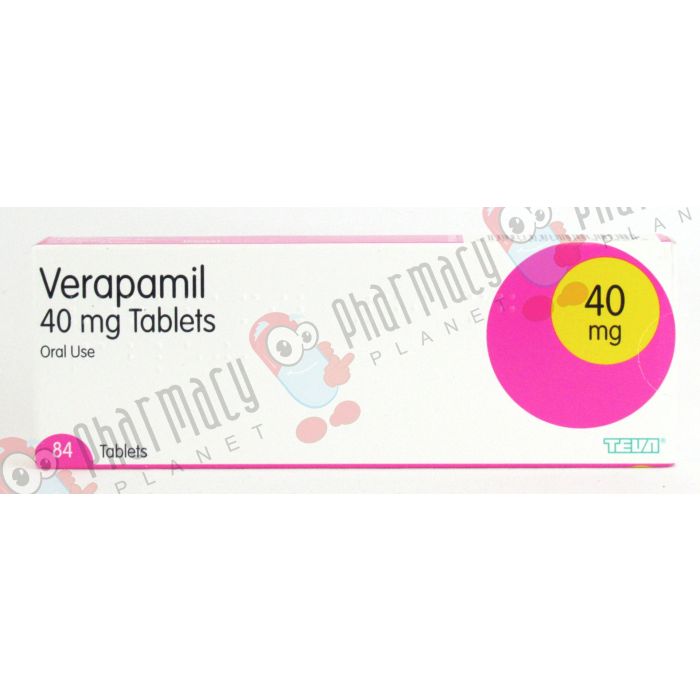Verapamil
Verapamil is an L-type calcium channel blocking drug, indicated in medicine for the treatment of hypertension, angina, heart rhythm disorders, and, recently, for headaches.2 Verapamil has also been used as a vasodilator during cryopreservation of blood vessels. It is a class 4 antiarrhythmic, more effective than digoxin in controlling the rate of cardiac contraction. This medication is only for oral consumption. Verapamil inhibits the entry of extracellular calcium through the membranes of myocardial and smooth muscle cells, as well as contractile cells and the conduction system of the heart. Plasma calcium levels remain unchanged.
the items you wish
to order

by our qualified
prescriber
to your door step
Please use the options provided to make your final selection.

| Brand | Medicine Strength | Size | Price |
|---|---|---|---|
| Verapamil (Generic) | 120mg | 28 Tablets | 32.00 |
| Verapamil (Generic) | 120mg | 56 Tablets | 44.00 |
| Verapamil (Generic) | 120mg | 84 Tablets | 56.00 |
| Verapamil (Generic) | 160mg | 112 Tablets | 143.00 |
| Verapamil (Generic) | 160mg | 168 Tablets | 210.00 |
| Verapamil (Generic) | 160mg | 56 Tablets | 75.00 |
| Verapamil (Generic) | 40mg | 168 Tablets | 47.00 |
| Verapamil (Generic) | 40mg | 252 Tablets | 50.00 |
| Verapamil (Generic) | 40mg | 84 Tablets | 33.00 |
| Verapamil (Generic) | 80mg | 168 Tablets | 51.00 |
| Verapamil (Generic) | 80mg | 252 Tablets | 69.00 |
| Verapamil (Generic) | 80mg | 84 Tablets | 32.00 |
| Securon SR | 240mg | 28 Tablets | 38.00 |
| Securon SR | 240mg | 56 Tablets | 69.00 |
| Securon SR | 240mg | 84 Tablets | 87.00 |
| Half Securon SR | 120mg | 28 Tablets | 38.00 |
| Half Securon SR | 120mg | 56 Tablets | 69.00 |
| Half Securon SR | 120mg | 84 Tablets | 92.00 |
It looks like you missed filling in questions from the last consultation.Click Here to submit your response.


It is the prescribers duty to ensure that the medicine is being used safely and appropriately. please answer a few questions about yourself to help us process your request.
Customer Service Team
Confidentiality & Authenticity Assured
- Fully Regulated UK Pharmacy
- Authentic UK sourced medicines only.
- Trading for more than 10 years.
- Information Governance lead ensures all data is confidential
Need Help With Your Questionnaire?
Our customer service team is on hand Monday-Friday to help you with your queries.
Please call us on 08009788956 or
email us at: headoffice@pharmacyplanet.com
Verapamil is an L-type calcium channel blocking drug, indicated in medicine for the treatment of hypertension, angina, heart rhythm disorders, and, recently, for headaches.2 Verapamil has also been used as a vasodilator during cryopreservation of blood vessels.










